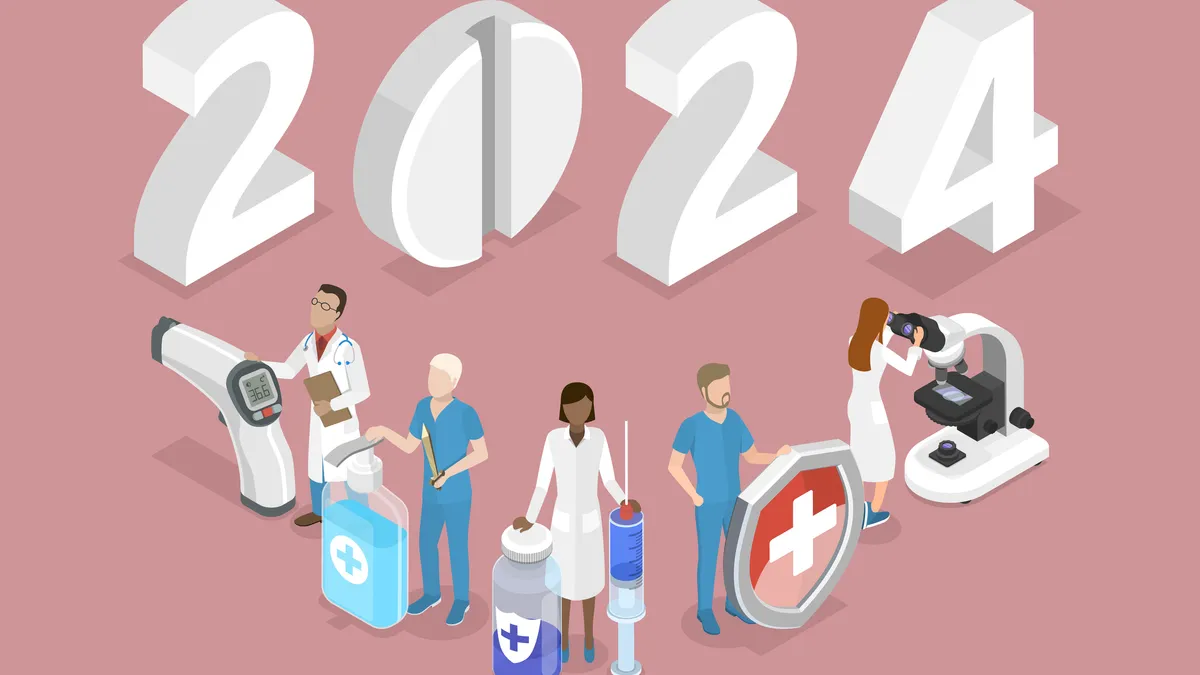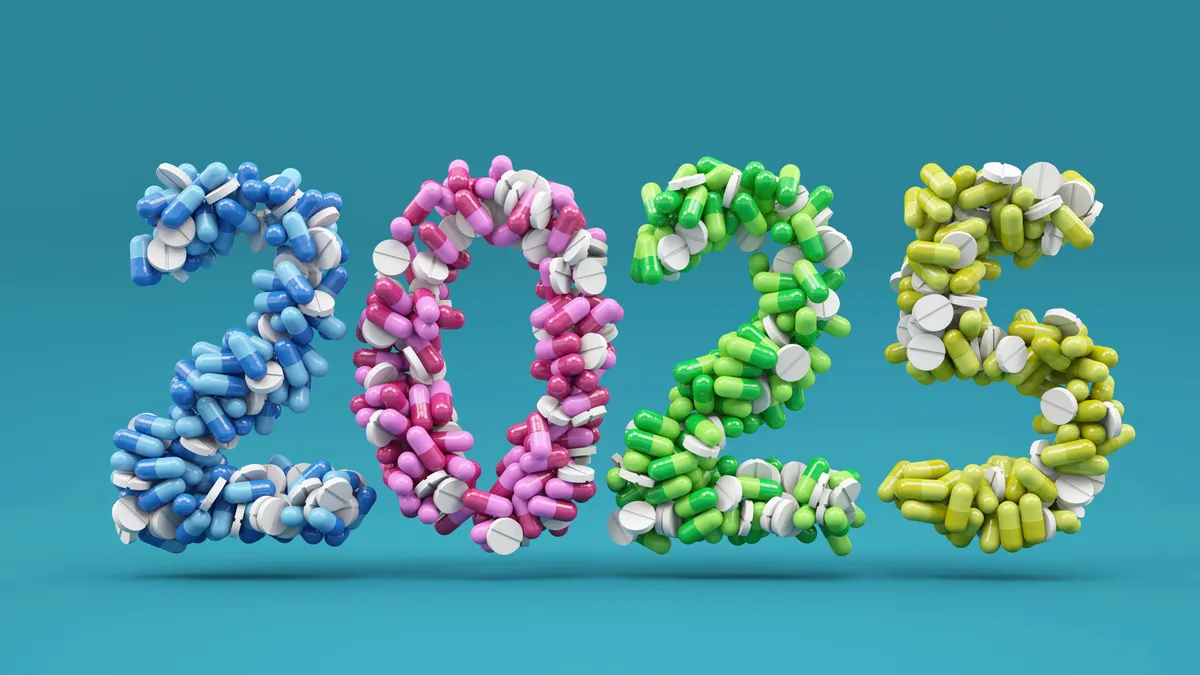This is the first installment of a two-part series examining pharma’s year ahead. The second installment explores innovation, policy and more.
In the annals of AI history, 2024 will likely go down as the year the technology truly went mainstream. Not only did AI become embedded further into many facets of everyday life, it was also a key feature on a platform that received the most coveted form of attention the scientific community can bestow.
In October, three researchers who leveraged the neural network AI program AlphaFold to predict protein structures won the Nobel Prize in chemistry.
The milestone signaled “the dawn of a new era” for the tech industry, Immunai’s CEO, Noam Solomon, told PharmaVoice, and showcased how AI is being used to revolutionize drug discovery, design and development.
This transformation has been long underway in pharma with companies working to harness the promise of AI while navigating potential downsides, including security risks, inherent bias and its impact on jobs.
And even while pharma awaits more regulatory clarity around AI, the industry is pushing ahead using the tech to make the business of drug development faster, safer and less costly.
Here’s where the field is headed in the coming year.
AI’s effect on three areas of healthcare

“2025 will be a critical year for advancing the transformative impact of digital health and AI in creating proactive, personalized and efficient healthcare systems. I anticipate three key highlights: First, we will see a larger role for AI in drug discovery and development, with new positive data emerging from phase 1 trials of AI-enabled drugs. Second, there will be even more personalized clinical decision-making and treatments, thanks to the growth of better data and algorithms. Third, use of digital biomarkers and remote patient monitoring technologies will become more precise and mainstream, bringing greater efficiencies to the ever-expanding costs of clinical trials and care management.”
Emre Ozcan, global head, digital health and devices, Merck KGaA, Darmstadt, Germany
GenAI will boost patient safety

“In the near future, we can expect the deployment of GenAI in literature review to identify adverse events and other safety signals. Advanced prompt engineering will allow life science organizations to quickly sift through vast amounts of unstructured data, such as cohort studies and clinical research articles, to isolate and report potential drug reactions. This approach allows for faster conversion of complex medical data into structured, machine-readable formats, significantly streamlining pharmacovigilance workflows.”
Sanmugam Aravinthan, senior director, development, Vigilance Detect, IQVIA
AI will ‘rehumanize’ rare disease treatment

“As our industry continues to embrace the integration of AI to augment human intelligence, it’s exciting to consider how these solutions can help overcome specific challenges and areas of health inequality, such as rare disease. While AI isn’t going to replace doctors anytime soon (and probably never will) when it comes to diagnosing and treating rare disease, these tools have the potential to speed processes and achieve things humans currently struggle with. If you’re looking for a match for a one-in-a-million disease, humans are never going to have the time to scan a million medical records or thousands of articles looking for a digital needle in petabytes of data. Soon doctors will collaborate with AI tools to find the needle and help them to understand why it’s there. Integrated with the right safeguards and with human beings in the loop, 2025 could see AI ‘rehumanize’ a healthcare system that currently feels deeply impersonal to those with rare disease.”
Paul Howard, senior director, public policy, Amicus Therapeutics
Pharma will take a low-risk approach to implementation

“Organizations will, in general, focus on leveraging technology where it has maximum impact, likely in low risk, high yield scenarios, to avoid regulatory challenges and alleviate operational burden. These scenarios will likely include repetitive tasks, where controls are implemented to avoid hallucinations or bias. Organizations will likely push any higher stakes, high-risk activities down the automation roadmap in order to avoid regulatory compliance concerns, especially as industry awaits more guidance and legislation. AI governance will be a key activity to ensure success and acceptance.”
Erik Terjesen, partner, Silicon Foundry
AI will drive predictable drug design

“2025 will see an increased uptake of AI use in drug development driven by the use of in silicon simulations that surpass the predictive accuracy of animal models and deliver results millions of times faster — within minutes instead of months. This leap will make drug design as iterative and predictive as automobile engineering, where virtual crash tests and simulations accelerate innovation. Over time, patients will gain earlier access to groundbreaking biopharmaceuticals. With AlphaFold's success in solving the protein-folding problem, the field is on the brink of rapid advancements, driven by AI leaders like Google DeepMind, OpenAI and Anthropic.”
Kevin Caldwell, CEO, co-founder, Ossium Health
AI will deliver on its promise in clinical trials

“This is the year AI converges with SaaS tools to redefine the clinical trial process entirely, shifting from a service-heavy, project-based model to a scalable, technology-first paradigm. Key innovations, like fully automated and error-free protocol builds, will enable therapy sponsors to embrace hyper-adaptive trial designs that evolve in real-time. This is not just about efficiency — it’s about reimagining the critical path in ways never seen before. Trials that once took years to plan and execute will be built and optimized in weeks. Sponsors will gain access to self-service platforms capable of dynamically adjusting to evolving needs, empowering teams to take control of the process without waiting on manual intervention. The fruits of AI will no longer be theoretical but deliver on its long-held promises, giving sponsors the tools to build smarter, faster and more resilient trials.”
Dr. Michelle Longmire, CEO, co-founder, Medable
AI’s rise will trigger labor challenges

“In 2025, the drug development and clinical trials industry will continue to face a critical shortage of skilled professionals, especially in specialized roles like data scientists, bioinformaticians and AI experts, as well as trial managers with experience in decentralized and digital trials. As AI, big data and digital health technologies become essential for trial design and patient recruitment, the demand for analytical and technical skills will likely exceed the available talent pool. Statisticians, for example, will need to be comfortable working with rapidly evolving technology, knowing how to incorporate AI and automation into their processes. Programmers will also need to adapt, finding ways to integrate advanced tools to improve data management and analysis. And just as important, we will need the ability to make complex data understandable and actionable for non-technical stakeholders.”
Graham Clark, CEO, Phastar
Predictive power will come to personalized medicine

“In personalized medicine, AI’s transformative role will deepen. By 2025, it will have the ability to routinely integrate genetic profiles, medical histories and environmental factors to customize treatments. For example, in oncology, AI can predict which cancer therapies are most effective for a specific mutation, minimizing side effects and improving outcomes.”
Paul Pallath, vice president, applied AI, Searce
AI will drive neuroscience advancements

“We will see advancements in neuroscience technologies driven by artificial intelligence, cutting-edge neuroimaging, and other emerging technologies such as brain-computer interfaces and neural implants. Many of these advancements can be combined with new therapeutic approaches and cell and gene therapies, which will broaden our understanding of brain function and neuro-regeneration pathways. It’s an exciting time and hope is building to bring some of these advancements to patients worldwide.”
Mike Kelly, CEO, president, NervGen Pharma
Timing will be critical

“I believe 2025 will be all about exploring how humans and technology can work together more effectively to improve data quality and ensure patient safety. While the technology is still being refined, GenAI will transform the user interface of the safety systems of tomorrow, making it easier to use and understand. To fully seize these opportunities we need to utilize technological advancements effectively. This includes exploring different AI models to see which works best for a given task at a specific point in time.”
Martin Holm-Petersen, chief technology and innovation officer, Qinecsa
Companies will mix and match AI

“In 2025, while continuing to focus on how best to harness the latest GenAI available, organizations will actively prioritize implementing the optimal mix and match of AI technology. Instead of defaulting to one preferred approach or considering the latest models as the right solution, we will perfect the deployment of advanced technologies on a case-by-case basis, whether that be one solution or a tailored blend of RPA, NLP, OCR or GenAI for example. These technologies bring optimal return when working to their individual strengths across a business process, with a human in the loop.”
Alison Sloane, general manager, Vigilance Detect, IQVIA

















